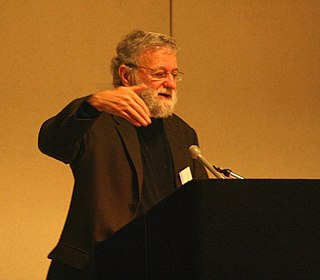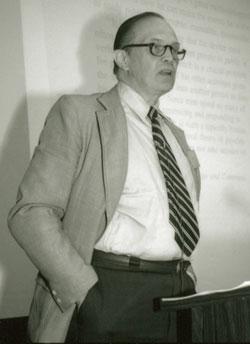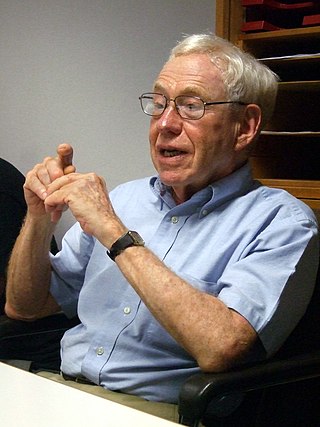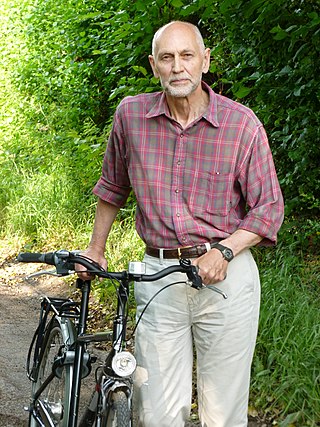Related Research Articles

Donald Arthur Norman is an American researcher, professor, and author. Norman is the director of The Design Lab at University of California, San Diego. He is best known for his books on design, especially The Design of Everyday Things. He is widely regarded for his expertise in the fields of design, usability engineering, and cognitive science, and has shaped the development of the field of cognitive systems engineering. He is a co-founder of the Nielsen Norman Group, along with Jakob Nielsen. He is also an IDEO fellow and a member of the Board of Trustees of IIT Institute of Design in Chicago. He also holds the title of Professor Emeritus of Cognitive Science at the University of California, San Diego. Norman is an active Distinguished Visiting Professor at the Korea Advanced Institute of Science and Technology (KAIST), where he spends two months a year teaching.

George Armitage Miller was an American psychologist who was one of the founders of cognitive psychology, and more broadly, of cognitive science. He also contributed to the birth of psycholinguistics. Miller wrote several books and directed the development of WordNet, an online word-linkage database usable by computer programs. He authored the paper, "The Magical Number Seven, Plus or Minus Two," in which he observed that many different experimental findings considered together reveal the presence of an average limit of seven for human short-term memory capacity. This paper is frequently cited by psychologists and in the wider culture. Miller won numerous awards, including the National Medal of Science.
George William Humphrey FRSC was a British psychologist, author, and philosopher. He was the founder of the Canadian Psychological Association, the first Director of the Institute of Experimental Psychology, and Professor of Psychology at the University of Oxford. Humphrey's research concentrated on behavioral studies such as reinforcement, habituation, and apparent movements, as well as psychophysical topics like audiogenic seizures. He is known for Humphrey's Law.

Hubert Lederer Dreyfus was an American philosopher and professor of philosophy at the University of California, Berkeley. His main interests included phenomenology, existentialism and the philosophy of both psychology and literature, as well as the philosophical implications of artificial intelligence. He was widely known for his exegesis of Martin Heidegger, which critics labeled "Dreydegger".

Robert C. Solomon was a philosopher and business ethicist, notable author, and "Distinguished Teaching Professor of Business and Philosophy" at the University of Texas at Austin, where he held a named chair and taught for more than 30 years, authoring The Passions: Emotions and the Meaning of Life (1976) and more than 45 other books and editions. Critical of the narrow focus of Anglo-American analytic philosophy, which he thought denied human nature and abdicated the important questions of life, he instead wrote analytically in response to the continental discourses of phenomenology and existentialism, on sex and love, on business ethics, and on other topics to which he brought an Aristotelian perspective on virtue ethics. He also wrote A Short History of Philosophy and others with his wife, Professor Kathleen Higgins.
Albert Cook Outler was a 20th-century American Methodist historian, theologian, and pastor. He was a professor at Duke University, Yale University, and Southern Methodist University. He was a key figure in the 20th-century ecumenical movement.
Keith E. Stanovich is a Canadian psychologist. He is an Emeritus Professor of Applied Psychology and Human Development at the University of Toronto and former Canada Research Chair of Applied Cognitive Science. His research areas are the psychology of reasoning and the psychology of reading. His research in the field of reading was fundamental to the emergence of today's scientific consensus about what reading is, how it works, and what it does for the mind. His research on the cognitive basis of rationality has been featured in the journal Behavioral and Brain Sciences and in recent books by Yale University Press and University of Chicago Press. His book What Intelligence Tests Miss won the 2010 Grawemeyer Award in Education. He received the 2012 E. L. Thorndike Career Achievement Award from the American Psychological Association.

Gregory Paul Currie FAHA is a British philosopher and academic, known for his work on philosophical aesthetics and the philosophy of mind. Currie is Emeritus Professor of Philosophy at the University of York and Executive Editor of Mind & Language.
Merlin Wilfred Donald is an emeritus Canadian professor of psychology, neuroanthropology, and cognitive neuroscience, at Case Western Reserve University, and in the Department of Psychology at Queen's University, Kingston, Ontario, Canada. He is noted for the position that evolutionary processes need to be considered in determining how the mind deals with symbolic information and language. In particular, he suggests that explicit, algorithmic processes may be inadequate to understanding how the mind works.
Donald Symons was an American anthropologist best known as one of the founders of evolutionary psychology, and for pioneering the study of human sexuality from an evolutionary perspective. He is one of the most cited researchers in contemporary sex research. His work is referenced by scientists investigating an extremely diverse range of sexual phenomena. Harvard psychologist Steven Pinker describes Symons' The Evolution of Human Sexuality (1979) as a "groundbreaking book" and "a landmark in its synthesis of evolutionary biology, anthropology, physiology, psychology, fiction, and cultural analysis, written with a combination of rigor and wit. It was a model for all subsequent books that apply evolution to human affairs, particularly mine." Symons is Professor Emeritus in the Department of Anthropology at the University of California, Santa Barbara. His most recent work, with Catherine Salmon, is Warrior Lovers, an evolutionary analysis of slash fiction.
Leo Braudy is University Professor and Professor of English at the University of Southern California, where he teaches 17th- and 18th-century English literature, film history and criticism, and American culture. He has previously taught at Yale, Columbia, and Johns Hopkins University. He is best known for his cultural studies scholarship on celebrity, masculinity, and film, and is frequently sought after for interviews on popular culture, Hollywood cinema, and the American zeitgeist of the 1950s.
David Fredrick Bjorklund is an American professor of psychology at Florida Atlantic University. His areas of research interest include cognitive development and evolutionary developmental psychology. His works include authoring several books and over 130 scientific papers. He is editor of the peer-reviewed Journal of Experimental Child Psychology.
Daniel Merton Wegner was an American social psychologist. He was a professor of psychology at Harvard University and a fellow of both the American Association for the Advancement of Science and the American Academy of Arts and Sciences. He was known for applying experimental psychology to the topics of mental control and conscious will, and for originating the study of transactive memory and action identification. In The Illusion of Conscious Will and other works, he argued that the human sense of free will is an illusion.
Jerrold Levinson is distinguished university professor of philosophy at the University of Maryland, College Park. He is particularly noted for his work on defining art, the aesthetics of music, ontology of art, philosophy of film, interpretation, aesthetics experience, and humour.
Charles Lemert is an American born social theorist and sociologist. He has written extensively on social theory, globalization and culture. He has contributed to many key debates in social thought, authoring dozens of books including his text Social Things: An Introduction to the Sociological Life, 5th edition. From 1982 to 2010, he taught at Wesleyan University in Middletown, Connecticut. He currently lives in New Haven, Connecticut with his family.
Michael Wood is professor emeritus of English at Princeton University. He is a literary and cultural critic, and an author of critical and scholarly books as well as a writer of reviews, review articles, and columns.
Anat Ninio is a professor emeritus of psychology at the Hebrew University of Jerusalem, Israel. She specializes in the interactive context of language acquisition, the communicative functions of speech, pragmatic development, and syntactic development.
Gerald Paul Koocher is an American psychologist and past president of the American Psychological Association (APA). His interests include ethics, clinical child psychology and the study of scientific misconduct. He is Dean Emeritus Simmons University and also holds an academic appointment at Harvard Medical School. Koocher has over 350 publications including 18 books and has edited three scholarly journals including Ethics & Behavior which he founded. The APA's Hoffman Report implicated Koocher for his role in creating memos to justify sexual, physical and emotional abuse of prisoners.

Norman Kent Denzin was an American professor of sociology. He was an emeritus professor in the Department of Sociology at the University of Illinois at Urbana–Champaign, where he was research professor of communications, College of Communications scholar, professor of sociology, professor of cinema studies, professor in the Unit for Criticism and Interpretive Theory. Denzin's academic interests included interpretive theory, performance studies, qualitative research methodology, and the study of media, culture and society.
Judy Forgot is a play by Avery Hopwood that was adapted into a 1915 film. The film is a five part comedy. Marie Cahill starred in the film. T. Hayes Hunter directed. It was produced by Universal Film Manufacturing. It was advertised as a screaming farce comedy hit filmed in five acts. Raymond L. Schrock wrote the screenplay.
References
- 1 2 "Home". jseamon.faculty.wesleyan.edu.
- ↑ "Books – John G. Seamon".
- ↑ Roodin, Paul A. "Human Memory: Contemporary Readings. First Edition (Book Review)." Journal of College Science Teaching 10.6 (1981): 385.
- ↑ Stone, Alan A. "John Seamon's Memory & Movies: What Films Can Teach Us about Memory." Cerebrum 2016: Jan-Feb (2016)
- ↑ O'Loughlin, Ian, Annette Kuhn, Daniel Biltereyst, and Philippe Meers. "Review: Memory and Movies: What Films Can Teach Us about Memory." Memory Studies 10.1 (2017): 93-96.